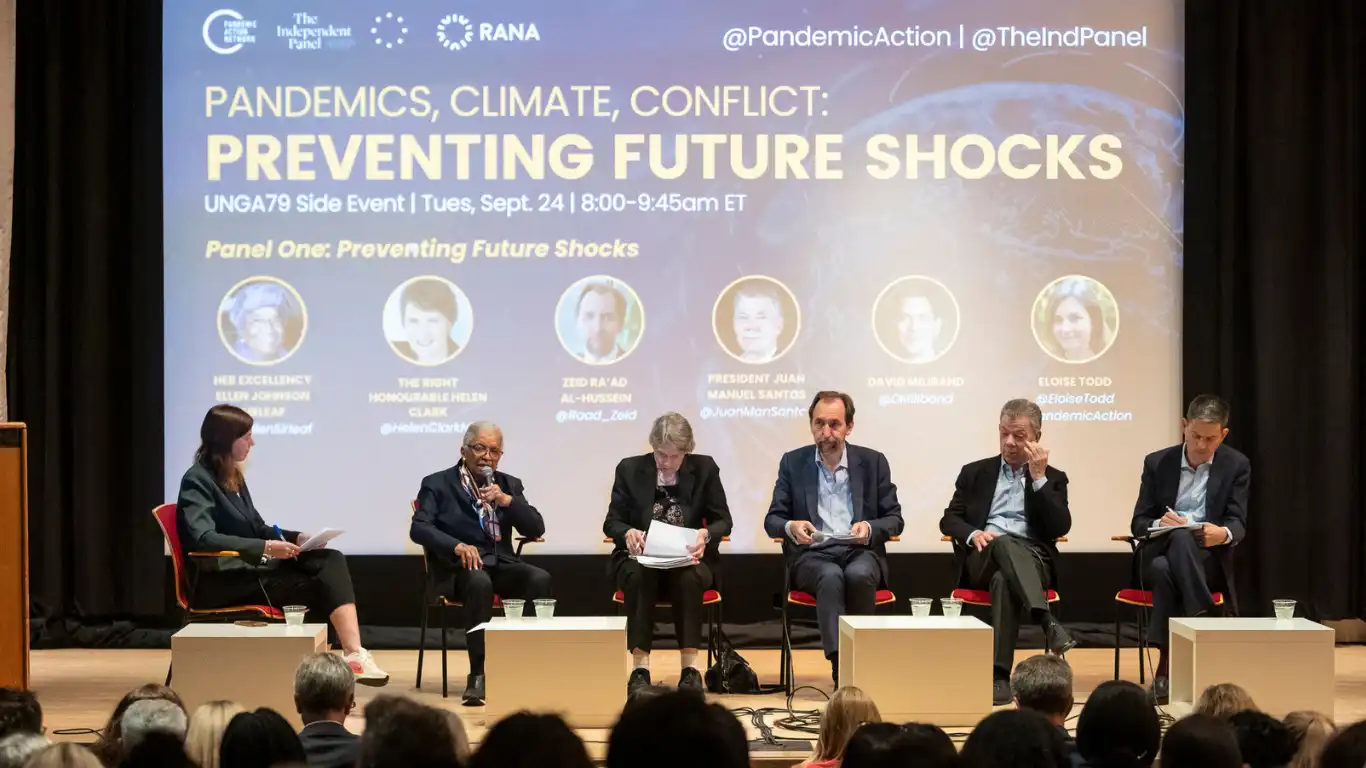In an era of crises — climate, pandemics, and conflict, how do we get leaders to invest in prevention and preparedness rather than just responding to a series of rolling crises? This moment calls for a different level of leadership and courage.
Pandemics, Climate, Conflict: Preventing Future Shocks — hosted by PAN, the Independent Panel for Pandemic Preparedness and Response, and Resilience Action Network Africa (RANA) — gathered eminent world leaders together with hundreds of partners for a candid discussion on the current political state of play, how to approach long-view leadership, and the actions necessary to ensure we are prepared to respond to and prevent future global shocks.
The panelists shared their perspectives on the compounding shocks affecting lives today.
Dr. Joanne Liu put it simply, “Pandemics + climate + conflict, it’s a toxic mix — a recipe for disaster. Climate is an amplifier of existing problems, and we need to stop dragging our feet about the loss and damage of what is related to climate change.” CEPI’s Dr. Samia Saad underscored this point, “You cannot look at climate without looking at health. It cannot be about trade offs or picking crises — they are all interconnected.” The panelists connected the dots for an urgent long-view leadership approach to ensure the world is better prepared for a more resilient future. Because “Resilience takes time — and we must start now,” as Dr. Ethel Maciel, Brazil’s Vice Minister of Health, reminded the room, pointing to Brazil’s G20 priorities and foreshadowing anticipated G20 declarations on climate and One Health.
The unifying thread across all of our panelists was urgency: We must take collective action NOW. As David Miliband shared, “Action leads to hope.”
Representing the Elders, President Juan Manuel Santos called out a “pandemic of inaction.” Her Excellency Ellen Johnson Sirleaf urged leaders to not “stand above the problem, but be part of the pathway.” Zeid Ra’ad Al Hussein called for urgent repair of distrust between African and high-income countries in order to advance an equitable pandemic agreement. And, the Right Honourable Helen Clark called for “long-view leadership,” noting to address connected crises, “If you try and pick away one by one, you won’t be as effective as mechanisms that enable a more holistic view.”
PAN’s Executive Director and Co-Founder Eloise Todd concluded the convening calling out, “We are working on a resilience agenda — we cannot win on one issue without dealing with the more. But, we cannot take that one alone, so we do that through connected networked advocacy. We want to advocate together, make change together, and build a better future.”
Thank you to our speakers for your insights and leadership. We were joined by:
- Her Excellency Ellen Johnson Sirleaf, Former President of Liberia, former Co-Chair of The Independent Panel, and member of The Elders
- The Right Honourable Helen Clark, Former Prime Minister of New Zealand, former Co-Chair of The Independent Panel, and member of The Elders
- Zeid Ra’ad Al Hussein, Member of The Elders, Former UN High Commissioner for Human Rights
- President Juan Manuel Santos, Former President of Colombia, Member of The Elders
- David Miliband, President and CEO, International Rescue Committee, and former member of The Independent Panel
- Dr. Ethel Maciel, Vice Minister, Ministry of Health Brazil
- Winnie Byanyima, Executive Director, UNAIDS
- Dr. John-Arne Røttingen, CEO, Wellcome
- Dr. Chikwe Ihekweazu, Deputy Executive Director, World Health Organization
- Dr. Joanne Liu, Professor at the School of Population and Global Health at McGill University (SPGH), Director of the Pandemics and Health Emergencies Readiness Lab at SPGH, and former member of The Independent Panel
- Dr. Samia Saad, Senior Advisor to the CEO, Coalition for Epidemic Preparedness Innovations

